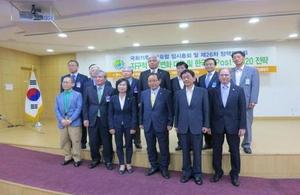National Assembly Climate Change Forum
Ambassador Wightman speaks at National Assembly Climate Change Forum

HMA Climate change forum
National Assembly Speaker Chung, Representative Kim, Representative Jin, Representative Kim, Professor Jeon, Professor Kim, Vice Chairman Rha, ladies and gentlemen, I am delighted to be here at the opening of this important Forum meeting.
The next 18 months are crucial as we head towards the Paris climate talks.
Momentum is building. This month we saw President Obama launch aggressive plans to cut emissions from the US power sector, while China announced it would set an absolute cap on emissions. More and more countries are passing climate legislation – eight more in 2013 making a global total of 500 climate laws in 66 countries. Carbon pricing initiatives now cover almost a quarter of global emissions, with China having the second largest carbon market in the world.
We are making deep carbon cuts in the UK, and we have a legally binding target to reduce our emissions by 80% by 2050 against 1990 levels. At the EU level, we are supporting a binding EU-wide 2030 target of at least 40%.
Here in Korea, I am delighted that President Park has re-affirmed her commitment to Korea’s 2020 emissions target. Your National Emissions Reduction Roadmap 2020 contains ambitious initiatives and South Korea’s actions are a powerful example to other countries.
But as you begin discussions on your post-2020 target, I’m well aware that there are some voices calling for Korea to reduce ambition and delay action.
South Korea is of course not alone in this. Even in the UK, despite wide support for climate policy including from industry, there is still a small but vocal minority that argues that tackling climate change is too costly and incompatible with economic growth.
This position is not tenable for two reasons.
First, we simply can’t afford not to tackle climate change. Like Korea we are a trading nation and we rely on a well-functioning global economy for our economic well-being. Runaway climate change would undermine that. It is clear from the IPCC’s recent report that a four degree Celsius increase in the world’s temperature would be catastrophic for global economic development.
The Financial Times newspaper recently wrote that we should look at climate change in the same way we look at the consequences of nuclear war. The risk of catastrophic results justifies immediate, serious action.
Secondly, tackling climate change brings huge economic opportunities – for new sources of growth and jobs. I know that President Park sees low carbon technology and energy efficiency as a core part of Korea’s Creative Economy.
In the UK we are on track for the fastest growth in the G7 this year, and yet our carbon emissions are down 21% against 1990 levels. The low carbon sector is a key driver of this growth – growing at over 4% a year and supporting a million jobs.
So there are clearly compelling arguments for action, but we need to do better at getting this message out and ensuring the risks and opportunities are well understood.
And you, the legislators and experts who make up this forum, have an important role in this, building greater public and political support for a legally binding global deal in 2015.
I really hope that South Korea will join the EU in putting forward an ambitious post-2020 contribution in the first quarter of 2015, to help build momentum towards the UN climate meeting in Paris. South Korea has a crucial role to play. So many countries look to you as model to follow. The world needs South Korea to show leadership and ambition.
I would like to leave you with something Ban Ki Moon said last month which I think frames our task perfectly.
“My challenge to all political and business leaders, all concerned citizens and voters is simple: be at the head of the race. Don’t get left behind. Don’t be on the losing side of history. Let us work together to make climate change a top priority for all leaders – at home and in the global arena. Let us take advantage of the opportunities presented by climate action and lay the foundations for a more prosperous and secure future for all.”
I wish you a productive discussion today. Thank you.